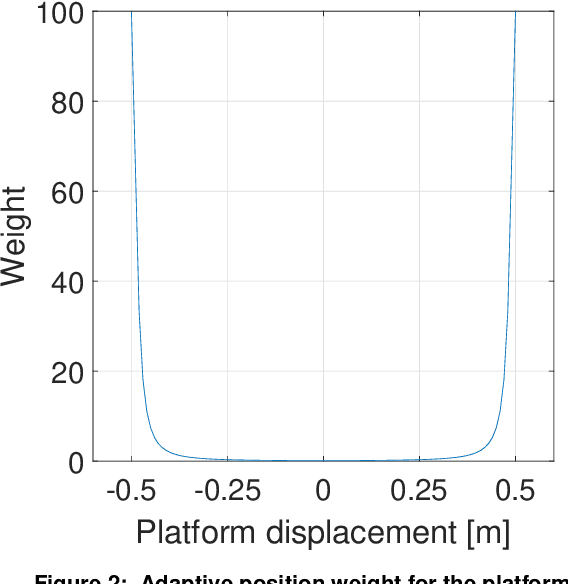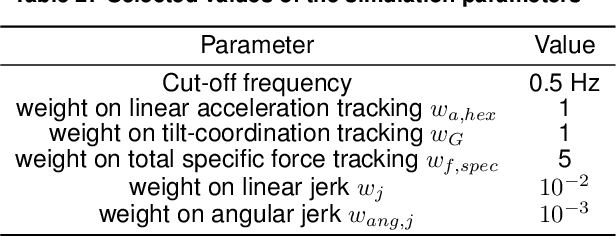Vishrut Jain
Reducing Discomfort in Driving Simulators: Motion Cueing for Motion Sickness Mitigation
Oct 02, 2025Abstract:Driving simulators are increasingly used in research and development. However, simulators often cause motion sickness due to downscaled motion and unscaled veridical visuals. In this paper, a motion cueing algorithm is proposed that reduces motion sickness as predicted by the subjective vertical conflict (SVC) model using model predictive control (MPC). Both sensory conflict and specific force errors are penalised in the cost function, allowing the algorithm to jointly optimise fidelity and comfort. Human-in-the-loop experiments were conducted to compare four simulator motion settings: two variations of our MPC-based algorithm, one focused on pure specific force tracking and the second compromising specific force tracking and motion sickness minimisation, as well as reference adaptive washout and no motion cases. The experiments were performed on a hexapod driving simulator with participants exposed to passive driving. Experimental motion sickness results closely matched the sickness model predictions. As predicted by the model, the no motion condition yielded the lowest sickness levels. However, it was rated lowest in terms of fidelity. The compromise solution reduced sickness by over 50% (average MISC level 3 to 1.5) compared to adaptive washout and the algorithm focusing on specific force tracking, without any significant reduction in fidelity rating. The proposed approach for developing MCA that takes into account both the simulator dynamics and time evolution of motion sickness offers a significant advancement in achieving an optimal control of motion sickness and specific force recreation in driving simulators, supporting broader simulator use.
A Vehicle System for Navigating Among Vulnerable Road Users Including Remote Operation
May 08, 2025



Abstract:We present a vehicle system capable of navigating safely and efficiently around Vulnerable Road Users (VRUs), such as pedestrians and cyclists. The system comprises key modules for environment perception, localization and mapping, motion planning, and control, integrated into a prototype vehicle. A key innovation is a motion planner based on Topology-driven Model Predictive Control (T-MPC). The guidance layer generates multiple trajectories in parallel, each representing a distinct strategy for obstacle avoidance or non-passing. The underlying trajectory optimization constrains the joint probability of collision with VRUs under generic uncertainties. To address extraordinary situations ("edge cases") that go beyond the autonomous capabilities - such as construction zones or encounters with emergency responders - the system includes an option for remote human operation, supported by visual and haptic guidance. In simulation, our motion planner outperforms three baseline approaches in terms of safety and efficiency. We also demonstrate the full system in prototype vehicle tests on a closed track, both in autonomous and remotely operated modes.
Motion Cueing Algorithm for Effective Motion Perception: A frequency-splitting MPC Approach
Sep 04, 2023



Abstract:Model predictive control (MPC) is a promising technique for motion cueing in driving simulators, but its high computation time limits widespread real-time application. This paper proposes a hybrid algorithm that combines filter-based and MPC-based techniques to improve specific force tracking while reducing computation time. The proposed algorithm divides the reference acceleration into low-frequency and high-frequency components. The high-frequency component serves as a reference for translational motion to avoid workspace limit violations, while the low-frequency component is for tilt coordination. The total acceleration serves as a reference for combined specific force with the highest priority to enable compensation of deviations from its reference values. The algorithm uses constraints in the MPC formulation to account for workspace limits and workspace management is applied. The investigated scenarios were a step signal, a multi-sine wave and a recorded real-drive slalom maneuver. Based on the conducted simulations, the algorithm produces approximately 15% smaller root means squared error (RMSE) for the step signal compared to the state-of-the-art. Around 16% improvement is observed when the real-drive scenario is used as the simulation scenario, and for the multi-sine wave, 90% improvement is observed. At higher prediction horizons the algorithm matches the performance of a state-of-the-art MPC-based motion cueing algorithm. Finally, for all prediction horizons, the frequency-splitting algorithm produced faster results. The pre-generated references reduce the required prediction horizon and computational complexity while improving tracking performance. Hence, the proposed frequency-splitting algorithm outperforms state-of-the-art MPC-based algorithm and offers promise for real-time application in driving simulators.
Computationally-efficient Motion Cueing Algorithm via Model Predictive Control
Apr 06, 2023



Abstract:Driving simulators have been used in the automotive industry for many years because of their ability to perform tests in a safe, reproducible and controlled immersive virtual environment. The improved performance of the simulator and its ability to recreate in-vehicle experience for the user is established through motion cueing algorithms (MCA). Such algorithms have constantly been developed with model predictive control (MPC) acting as the main control technique. Currently, available MPC-based methods either compute the optimal controller online or derive an explicit control law offline. These approaches limit the applicability of the MCA for real-time applications due to online computational costs and/or offline memory storage issues. This research presents a solution to deal with issues of offline and online solving through a hybrid approach. For this, an explicit MPC is used to generate a look-up table to provide an initial guess as a warm-start for the implicit MPC-based MCA. From the simulations, it is observed that the presented hybrid approach is able to reduce online computation load by shifting it offline using the explicit controller. Further, the algorithm demonstrates a good tracking performance with a significant reduction of computation time in a complex driving scenario using an emulator environment of a driving simulator.
 Add to Chrome
Add to Chrome Add to Firefox
Add to Firefox Add to Edge
Add to Edge